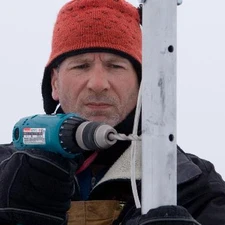Ian Joughin

The 2012 Louis Agassiz Medal is awarded to Ian Joughin for outstanding contributions to the study of the dynamics and mass balance of polar ice sheets using differential SAR interferometry and other techniques that he has helped to pioneer.
Ian Joughin is an outstanding scientist who has helped to expose the inner workings of Earth’s great ice sheets and to change the way that polar glaciology is conducted. Using satellite remote sensing techniques such as interferometric synthetic aperture radar, a method he helped to develop, he has shown that the Greenland and Antarctic ice sheets are lively and responsive players on the global stage. He has made fundamental contributions to our capabilities to observe ice dynamics, to interpret those observations in terms of basal processes, and to our knowledge of sub-decadal-scale variations in mass fluxes in outlet glaciers. Joughin has shown that outlet glaciers in Greenland and ice streams in Antarctica accelerate and slow on surprisingly short time scales. His research has exposed the arterial organization of West Antarctic ice streams, the progressive slow-down of a large Antarctic ice stream, and the speed-up of several Greenland glaciers. Using dynamical models he has coupled observations of surface velocities to basal properties and subglacial melt rates, showing long-distance transport of melt water in West Antarctica. In Greenland, he has shown that its supraglacial lakes can drain with amazing rapidity, lubricating the bed, and affecting ice motion over large areas. Joughin has helped transform glaciology from a data-poor field, where challenging logistics limited what we could know, to a field where satellite observations allow detailed study of a continental-scale ice sheet. He is a world leader in producing the extensive high-resolution data sets that must underlie the assessment of ice-sheet behaviour and in interpreting those data to guide the assessment. His contributions have played an important role in convincing the broader scientific community, policy makers, and the lay public that Earth’s ice sheets are variable on human timescales, not just over millennia. Such insight is critical to understanding the potential contribution of ice sheets to sea level rise. Joughin has led field expeditions in Antarctica and Greenland and is respected as an exceptional scientist, a generous colleague, and selfless collaborator. Consistently willing to share his data and expertise, he sets a shining example of how open collaboration can advance science. Joughin is truly a worthy recipient of the Louis Agassiz Medal.
